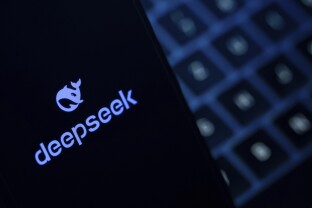Lawmakers from both parties are eager to curb apps suspected of sharing information with Chinese intelligence agencies. There’s one big problem: the apps keep popping up.
For now, Congress has taken a one-by-one approach to Chinese apps. And while the politics of app bans remains tricky, lawmakers told NOTUS they think momentum is growing for a broader approach.
“The problem is that if you do it on an application-specific basis, then there’ll be another one that pops up with a different name,” Republican Sen. John Cornyn told NOTUS. “It’s what’s sometimes called whack-a-mole.”
“Eventually, there has to be a systematic approach against misuse of social media for spying,” Democrat Sen. Richard Blumenthal said.
Lawmakers are currently focused on banning the China-based artificial intelligence chatbot DeepSeek from government devices over concerns that it could leak users’ queries and information to Chinese authorities. This follows Congress’ bill to try to force ByteDance, TikTok’s parent company, to sell to a company not controlled by the Chinese Communist Party or else be banned from all U.S. devices.
Congress has not yet seriously tried to ban or limit the reach of other Chinese apps.
Rep. Darin LaHood, one of the co-sponsors of the bill attempting to ban DeepSeek, told NOTUS he believes this approach is right for now.
“The predicate for our bill is protecting the national security of the United States,” LaHood said. “I think we’re acutely focused on the national security of the United States, and so this is a targeted approach on DeepSeek who’s directly tied to the CCP.”
While DeepSeek’s most recent model is open-source and its code can be changed to work outside Chinese government regulations, security experts warn that DeepSeeks’s base app is capable of sharing information with Chinese authorities.
Other apps could have the same vulnerabilities, lawmakers warned. Rep. John Moolenaar said that 2017 laws in China say “whenever the Chinese government wants information, it’s illegal not to provide that information.”
“As a result of that, people’s data is insecure and people are at risk of being leveraged by the Chinese Communist Party,” he said.
Rep. Rich McCormick told NOTUS that Congress “should be smart enough to come up with legislation that’s more broad.”
“Anything that’s used by a foreign entity to track or to manipulate the population probably should be eliminated,” he said.
Sens. Elizabeth Warren and Lindsey Graham proposed a bill to create a commission for data privacy. A commission, Warren said, would be nimble enough to adapt to new data harvesting tactics while still having broad enough authority to protect users.
“Companies can reform, apps can be rewritten,” she said. “We need a comprehensive strategy so that all companies are playing by the same set of rules and all companies must have data privacy rules that are in line with our values.”
Still, data privacy legislation might find a difficult path in this Congress. A previous effort to establish systematic privacy protections for children on social media in the U.S. passed in the Senate with overwhelming support, 91-3, but did not make it to the House floor due to Republican concerns that the bill could restrict freedom of speech.
“I think we’ll see a variety of approaches,” Sen. Ted Cruz told NOTUS. “What I have advocated is that we should proceed slowly because it is incredibly complicated and there is a real risk of unintended consequences.”
“Joe Biden and the Democrats favor a European-style regulatory system,” Cruz said. “I can think of very few approaches that would be better designed to ensure that America loses the race for AI, for example, and is beaten by our competitors.”
Any approach to counter Chinese data-gathering must be a response to actual documented threats and not a response to hypothetical concerns, Rep. Dusty Johnson said. He argued that over-regulating access to China-developed apps risks becoming a competitive disadvantage for the U.S.
“I think it’s perfectly appropriate to have a case-by-case analysis because these security considerations are indeed based on real threats,” Johnson said. “There are going to be some tools that are developed overseas that can help make America stronger. There are gonna be other tools that developed overseas that have the potential to threaten America — you should, not ban first.”
—
Samuel Larreal is a NOTUS reporter and an Allbritton Journalism Institute fellow.
Sign in
Log into your free account with your email. Don’t have one?
Check your email for a one-time code.
We sent a 4-digit code to . Enter the pin to confirm your account.
New code will be available in 1:00
Let’s try this again.
We encountered an error with the passcode sent to . Please reenter your email.


